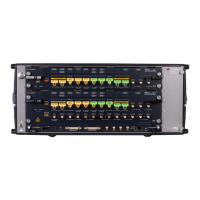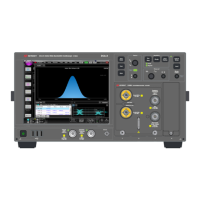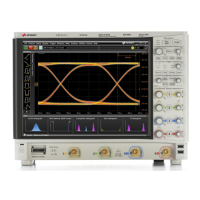• When testing an active (powered) DUT, be
aware that the capacitors can hold charges
even after power is removed from the DUT.
Voltage on the board can exceed the
maximum input level of the instrument and
transient voltage may occur from DUT. Utilize
an inline attenuator (e.g. 3 dB) to reduce the
voltage entering the instrument.
Use Cable Discharger box to discharge
cables
• Loose cables may hold an electrostatic charge.
Before connecting any cable to product
connector, short the center and outer
conductors of the cable together to discharge
any transient voltages that may be present.
• You should use the cable discharger provided
with the initial product shipment and shown in
the following figures.
• Ground the box appropriately while
discharging a cable. Use the “GND”
connector of the box (as shown in the figure)
to the ground connector of the AXIe chassis.
For grounding, either use the accessories
provided with the discharger like the
grounding cable or an ESD mat which is
connected to the ground connector of the
AXIe chassis.
• Discharge your cables using the matching
connector e.g. 2.40 mm (also for 1.85 mm),
3.50 mm (also for 2.92 mm) and Mini-Coax.
You may stick the cable discharger box to
your instrument/AXIe chassis e.g. using the
fastener tape provided.
• Plastic fixtures can store charges and probing
powered devices can subject inputs to
damaging voltage and power levels. A poor
AC power supply into a product or DUT can
create AC transients, insufficient grounding,
or floating neutral lines which damages the
current to flow into or out of the instrument.
For more information about electrostatic
discharge, contact the Electrostatic
Discharge Association
www.esda.org
.
Use proper lifting techniques
• Lift the instrument by the handles when
transporting.
• Avoid picking up the instrument with your
hand over the front panel. If the instrument
slips, damage may occur to the front panel
connectors.
• Use a cart or two persons to help move any
heavy instrument.
Use proper packing for transport
• Instrument damage can result from using
packaging materials other than those
specified. Never use styrene pellets in any
shape as packaging materials. They do not
adequately cushion the equipment and can
cause equipment damage by generating
static electricity.
• If possible, retain the original packaging for
re-use when shipping the instrument.

